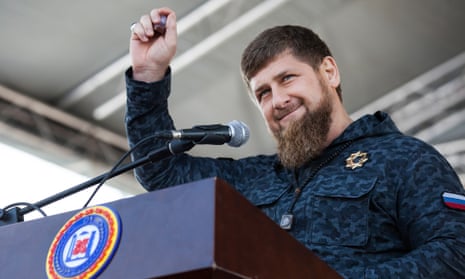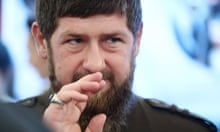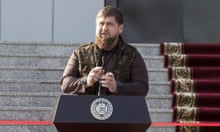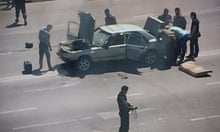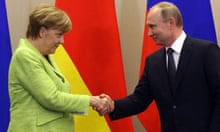Russian officials are actively investigating claims of a purge of gay men in Chechnya, a process that could lead to a showdown between Moscow and the local Kremlin-backed strongman, Ramzan Kadyrov.
Dozens of men in the southern republic are reported to have been held in extrajudicial detention and tortured as part of a campaign against gay males in Chechnya that began several months ago. Many have fled and are in hiding in other regions of Russia or have gone abroad.
The story was initially reported by the Russian newspaper Novaya Gazeta and was confirmed by the Guardian, which spoke to four gay men who had been caught up in the campaign. One of the men told of beatings and electric shock torture in a secret prison where he was held for more than a week.
Often federal authorities turn a blind eye to the frequent human rights abuses in Kadyrov’s Chechnya, but it appears the scale of the round-up and the international outcry has led to a concerted response from central Russian authorities.
In May, the German chancellor, Angela Merkel, urged Vladimir Putin to conduct a full investigation into the reports.
Elena Milashina, the Novaya Gazeta reporter who broke the story, said Putin had been briefed on the issue by Russia’s human rights ombudsman, Tatyana Moskalkova, and there was evidence the Russian investigators were attempting to get to the bottom of the allegations.
“Moskalkova was impressed by the strength of the evidence we have and has spoken to Putin about it,” said Milashina.
The investigator examining the allegations, Igor Sobol, has been given promotion in recent days, possibly another signal that authorities are taking the case seriously.
Many in Moscow are tired of the de facto independence Kadyrov enjoys to run Chechnya as his personal fiefdom in return for pledging loyalty on paper to Putin. But the Russian president has remained loyal to Kadyrov, believing he is the only man who can guarantee peace in Chechnya. Russia has fought two wars in the past two decades to retain control of the region.
Rights activists worry that Chechen authorities will do everything to obstruct the federal investigation into the allegations.
“Russian authorities should ensure a thorough and effective investigation, including making it clear to officials in Chechnya that sabotaging the process is not an option,” said Tanya Lokshina of Human Rights Watch.
Human Rights Watch released a report on Friday that provided further evidence of the anti-gay campaign. The organisation said three men it had spoken to had reported the presence of high-level Chechen officials when they had been tortured.
Most of the Chechen men involved are frightened about going public with their allegations because they fear not only for their own safety but that of their families. Homosexuality is a huge taboo in Chechnya and many fear reprisals from their own families if they come out publicly. They also fear their families will be made to suffer a “stain on their honour” for having a gay relative.
“Moscow must provide solid protection and full anonymity to victims and victims and allow remote testimonies to those willing to come forward,” said Lokshina.

Many of the Chechens are in safe houses in Russia, hoping to be granted visas to travel to western countries, but so far only two have received the green light. Milashina said most European embassies, including the British embassy, had declined to provide visas or travel documents. “They all say ‘we understand you but we can’t do anything to help’,” she said.
So far, the response from Chechen authorities has been denial and threats. Kadyrov, in an interview on 22 April, denied the allegations on the basis that there were “no gay men in Chechnya”. He said: “These are not traditional things, psychiatrically abnormal things. We don’t understand them. Our people do not understand.”
Chechnya’s press and information minister, Jambulat Umarov, wrote on Instagram that Novaya Gazeta should “apologise to the Chechen people” for the “filthy provocation” of suggesting gay people existed in Chechnya. He also suggested that people “who are more annoyed by your newspaper than we are” would “take care” of the journalists if they continued with their publications.
Putin summoned Kadyrov to Moscow for a meeting shortly after the story broke and is believed to have told him privately that threats against journalists from his officials were unacceptable.
